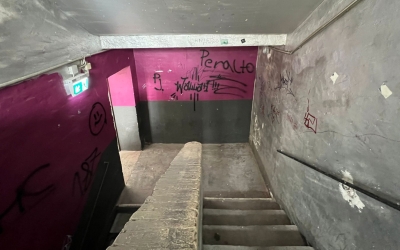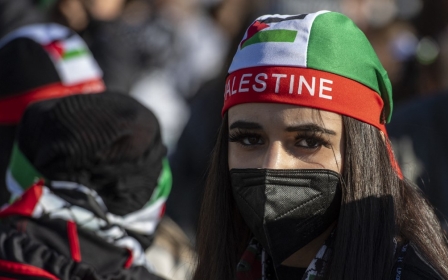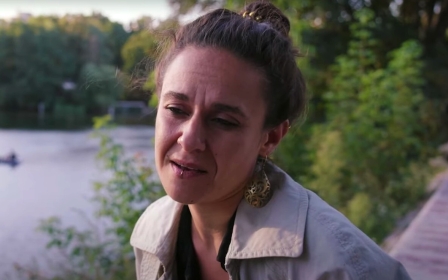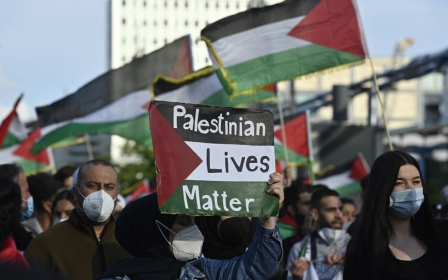Germany: Ruling in favour of fired Palestinian Deutsche Welle journalist a 'relief', says lawyer

A German court ruling in favour of a Palestinian journalist dismissed by state-owned broadcaster Deutsche Welle (DW) is the first step to rehabilitate her reputation, her lawyer has said.
Palestinian-Jordanian journalist Farah Maraqa won her lawsuit on Monday against DW, which dismissed her and six other journalists earlier this year on charges of antisemitism.
The Berlin Labour Court ordered DW to reinstate Maraqa and to pay for the costs of the legal dispute.
Hauke Rindsorf, Maraqa’s lawyer, said the ruling was a "relief for Farah in the difficult situation Deutsche Welle brought".
"One may see this as an important step to restore Farah’s professional reputation as a journalist"
- Farah Maraqa's laywer
"Regarding the reputation damage, it was severe, we are aware of that," Rindsorf told Middle East Eye.
New MEE newsletter: Jerusalem Dispatch
Sign up to get the latest insights and analysis on Israel-Palestine, alongside Turkey Unpacked and other MEE newsletters
"One may see this as an important step to restore Farah’s professional reputation as a journalist," he added.
The court ruling, which followed a hearing on 20 July, suggested that Maraqa’s termination was "legally unjustified", the journalist said on Twitter.
Maraqa was one of seven Arab journalists - from Palestine, Lebanon, and Syria - who were fired by DW from its Arabic service in February.
The dismissals were based on a controversial external investigation led by Ahmad Mansour, who has been accused of promoting anti-Muslim views.
Mansour, known for his pro-Israeli views, is a self-proclaimed German-Arab-Israeli expert on Muslim "radicalisation" and antisemitism.
Maraqa was allegedly terminated for previous articles that were highlighted in an article by Süddeutsche Zeitung in November 2021.
The Euro-Med Monitor found that her words were "taken out of context and misinterpreted" in a separate investigation.
In July, a judge suggested a settlement between Maraqa and DW in the form of a joint statement.
Maraqa proposed a statement that included a public apology, a retraction of allegations, and reputation rehabilitation that DW did not respond to.
'Anti-Palestinian sentiment'
The ruling on Monday was the second lawsuit that DW lost after firing the seven journalists.
In July, the Bonn Labour Court found that DW’s dismissal of Palestinian journalist Maram Salem was unlawful and the allegations of antisemitism against her were unfounded. In another case, DW settled.
All the remaining cases are still pending trial.
In a press release, the European Legal Support Centre (ELSC), which is advising Maraqa, stated that the dismissals by DW "manifested anti-Palestinian sentiment and leads to a significant chilling effect on any journalist who would cover Palestine/Israel".
Giovanni Fassina, director of the ELSC, said the ruling was a "relief".

"We hope this sends a clear message that they should stop their censorship practices," Fassina added.
"This case illustrates how the institutionalisation of the IHRA-WDA (International Holocaust Remembrance Alliance's definition of antisemitism) can lead to severe infringements upon freedom of expression and freedom of the press."
Repression toward pro-Palestinian activists, academics, and journalists is at an all-time high in Germany, particularly since the parliament's 2019 passage of an anti-BDS resolution.
Federal institutions began deeming all actions that support the boycott movement as antisemitic.
This has allowed universities, state governments, and public institutions to crack down on pro-Palestinian activism.
In June, the state-run Goethe Institute disinvited Palestinian poet and human rights activist Mohammed el-Kurd from speaking at a conference on far-right movements that was scheduled to be held in Hamburg.
DW has not responded to a request for comment at the time of publication.
Middle East Eye delivers independent and unrivalled coverage and analysis of the Middle East, North Africa and beyond. To learn more about republishing this content and the associated fees, please fill out this form. More about MEE can be found here.




